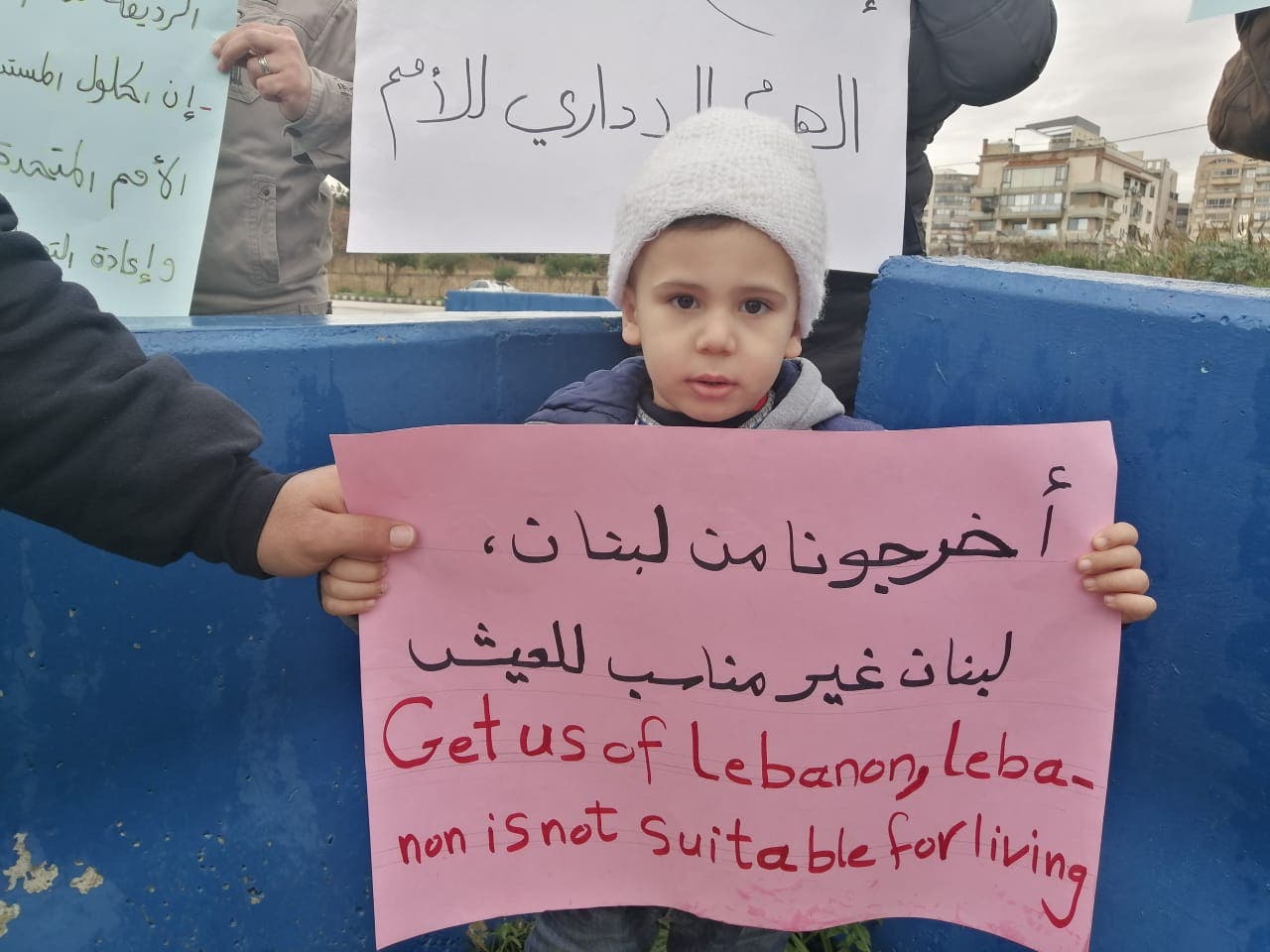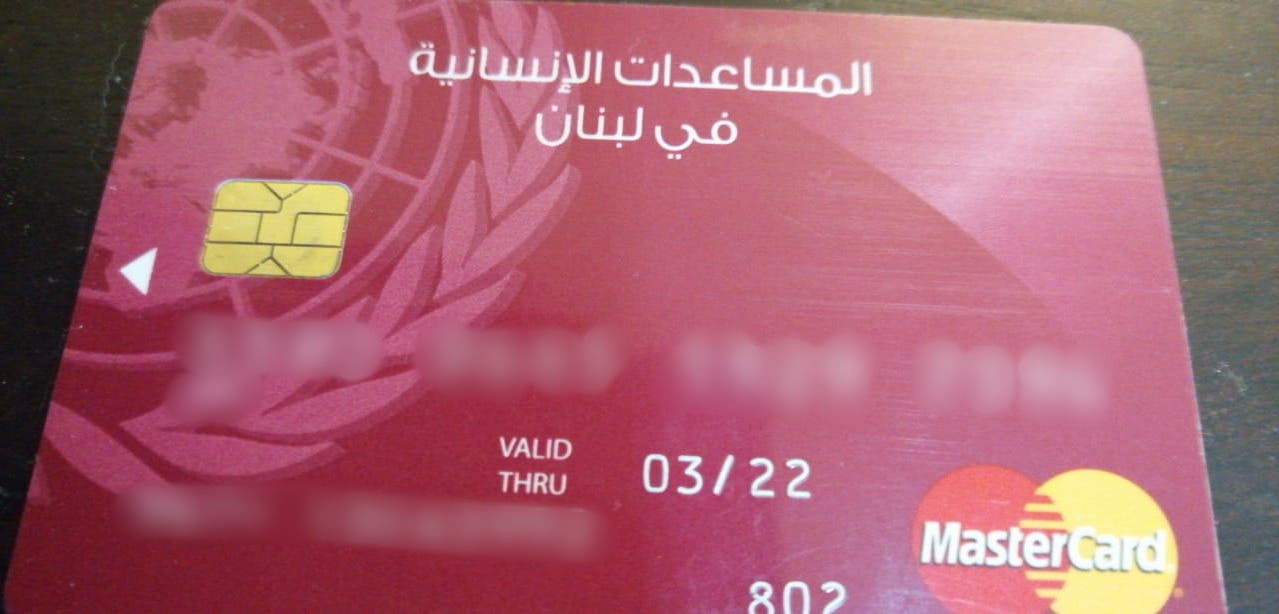Tue 11 February 2020:
The UN Commissioner for refugees is failing Syrian refugees in Lebanon, according to civil society organizations in the country, amid growing protests over their poor treatment.
Nearly 1.5 million Syrian refugees are currently living in Lebanon, 916,000 of whom are registered with the United Nations High Commissioner for Refugees (UNHCR).
Refugees accuse the UN body of mistreatment, failing to provide medical care, injustice in distributing aid and failing to provide protection in their protests in front of the commissioner’s offices.
One activist reported that a UNHCR official told a 16-year-old to work to feed her family after her mother asked for aid because her husband, the family’s breadwinner, could not join her in Lebanon.

Twenty-five civil society organizations have issued “recommendations” for the UNHCR, requesting that it “develops a practical plan to provide refugees with legal protection and improve their living conditions.”
Mohammad Hasan, founder and director of Access Center for Human Rights, said: “Lebanon’s political leaders are threatening [refugees] with forced deportations and random arrests, and the new government is one aligned with the Syrian regime. So we are very concerned about the status of Syrian refugees in Lebanon.”
Following nearly four months of Lebanese protests, a new government headed by Prime Minister Hassan Diab was appointed in mid-January.
Forced deportations
“Many Syrians [in Lebanon] live in extremely dire and vulnerable conditions,” stated a field report by Sahar Atrache, a senior advocate for the Middle East at Refugees International, published last month.
In 2019, the Lebanese Higher Defense Council announced that refugees who entered Lebanon illegally after April 24, 2019, would be deported. As a result, more than 2,700 Syrians were deported by Lebanon’s General Security Organization between May 21 and August 29, 2019, without being referred to a judge.
Human rights institutions and civil society organizations argue that there are no means of knowing when a refugee entered Lebanon, making the process of deportation a random one.
“There are people that have received death threats, people who defected from the Syrian regime, people who have problems with political parties here in Lebanon, these people are not protected [from deportation] although they are registered by the UNHCR under the protection cases,” said Syrian activist Nawar Baksarawi.
Often, refugees, especially males, have limited their movement drastically for fear of random identity checks, arrest or deportation by security forces, according to the field report by Atrache.
The UNHCR says it is “engaging with all concerned institutions” regarding the deportations “to ensure that people are able to express any concern they may have with regards to returning to their country of origin, and for their case to be duly assessed through an independent judicial review before a decision of deportation is taken,” the UNHCR’s Senior Strategic Communication and Advocacy Officer Omer Elnaiem said.
Civil society organizations say the UNHCR’s response is not enough.
“The UNHCR bears the responsibility of protecting Syrian refugees in Lebanon, and when such huge violations are happening and going unnoticed without the least form of defense such as a condemnation, the UNHCR should be held accountable,” Hasan whose center organized the signing of the recommendations, told Al Arabiya English.
‘We just want justice in aid distribution’
The UNHCR’s system of providing aid to the refugees is through a red card, and those who qualify for aid can withdraw $170 every month. Through an annual re-evaluation of the refugees’ situation, the commissioner distributes aid among those who need it.

“While we are working hard to further expand assistance, we remain severely constrained by funding limitations. This is forcing us and other humanitarian agencies to prioritize the most vulnerable refugees,” said Mireille Girard, UNHCR’s Representative in Lebanon, in a statement issued regarding the protests.
The UNHCR has received 50 percent of the funding it has requested through the Lebanon Crisis Response Plan, an inter-agency humanitarian effort, according to a UNCHR statement.
However, the Syrian protesters blame the UNHCR for “inefficiency in reevaluating the conditions of the refugees.” Some who have the red card and have left Lebanon have given the aid card to others who may not need it.
“I personally know people who went back to Syria or traveled elsewhere like Sweden and still receive aid because the UNHCR hasn’t tracked their cases,” Baksarawi, who is one of the organizers of the protests in front of the commissioner’s offices said.
In other cases, the Syrian refugees complain about not being “qualified” for aid.
“Some people are living in tents in the camp and they still don’t qualify for aid. We demand transparency in the criterion of people who ‘deserve’ aid and we want to know what they base their decisions on,” Baksarawi added. “We just want justice in distribution.”
Think your friends would be interested? Share this story!





